Caroline Leavitt's Blog, page 30
May 2, 2017
What's more fascinating than exploring a person's life story through the books they've chosen to read? New York Times Book Review editor Pamela Paul talks about MY LIFE WITH BOB and the fierce relationship between books and readers
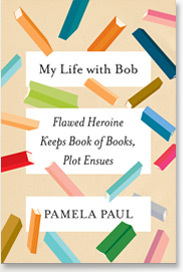
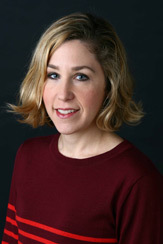
2013 was the year when we all began talking about Pamela Paul. To have a smart, funny, talented woman take on the editorship of the venerable New York Times Book Review, overseeing all book coverage at a time when women were not getting the review real estate that their male colleagues were, seemed like the best kind of change. And it absolutely has been. Ms. Paul (It doesn’t feel right to call her Pamela), started one of my favorite sections in the NYTBR, By The Book, where authors get to answer quirky, fascinating questions (By the Book is also..well, a book itself, edited by Paul). And more change is coming. But more than that, she’s the host of the weekly podcast, Inside the New York Times Book Review, and she’s a terrific author as well. The Washington Post named her debut, The Starter Marriage and the Future of Matrimony as one of the Best Books of 2002. The San Francisco Chronicle did the same for her second, Pornified. She’s published Parenting, Inc, , contributes to Time and is a columnist for Worth, as well as publishing in The Atlantic, The Washington Post, The New York Times Education Life, The Economist, Vogue, Slate and more.
She’s also been a guest on Oprah, Good Morning America, The Today Show, The Early Show, and Politically Incorrect, and has made regular appearances on CNN, Fox News, and MSNBC. And I’m so honored that I can also say she’s appearing on my blog, carolineleavittville.com. Oh, and she’s very, very funny on Facebook.
Her latest book, My Life with Bob is a memoir about the book lists that Paul kept, from girlhood on, always noting how each book she read defined her, enlightened her, and inspired her into traveling roads she might never have taken otherwise. It’s the kind of book that makes you get out that moleskin diary you bought five years ago and never touched, and now start writing down your thoughts about your own books and your own life. Like all great art, it makes you see your world--and your books-- differently. And how exciting is that?
Thank you so, so much, Ms. Paul. for letting me pepper you with questions. I’m so jazzed and honored to host you here. My Life with Bob is an ingenious idea. I wish I had done that growing up—though I certainly could start now.
I always want to know the “why now?” question—what was it that made you want to write this particular book at this particular time?
I had written about Bob in 2011 as a back page essay in the Book Review in the same issue I launched the By the Book column, which began with David Sedaris. And I wrote that essay in part to explain the idea behind By the Book – that a person’s life story could be told, in a way, through the books she’s read. That essay, “My Life with Bob,” ended up being one of the most popular essays we’d ever run. I got tons of emails and letters, many of which boiled down to one of two messages: Either “I keep a book of books too!” or “I wish I’d done that.”
I hadn’t thought about expanding it until my editor at Henry Holt suggested doing so at a lunch, as a follow up to the book we did together of collected By the Book columns. Usually, when someone else suggests a book idea, it doesn’t feel right – it’s like wearing a costume rather than your own clothes. I remember after “The Starter Marriage” came out, a number of editors approached me wanting me to write “The Starter Marriage II” or something to that effect, which didn’t interest me at all. It’s like, as a freelance writer, the difference between pitching a story idea of your own versus getting one assigned to you by an editor with his or her own idea. Only rarely does that other person’s idea resonate enough that you feel motivated to make it your own.
When my editor suggested a book around “My Life with Bob,” I hesitated at first because it felt so personal, and I prefer to write reported stories about other people – maybe with a first-person anecdotal lede, but in large part, I like to stay out of the story.
But I couldn’t reject the idea outright because it also felt like something I’d want to write and something I ought to write and maybe even something I needed to write. And for me, having that intrinsic motivation is so important to writing. If my heart isn’t in it, it’s very hard to gin up the energy to write. But when my heart is in something, I have the opposite problem – it’s hard for me to stop. I write sentences in my head while walking. I have trouble falling asleep because new paragraphs start swirling in my head. I wake up in the middle of the night to write bits down on a notepad by my bedside. That’s what immediately began to happen when I thought about turning Bob into this new book.
Did writing about books of your past—and who you were when you were reading them, make you want to reread them now to see the difference?
Mostly, I wanted to reread them to better remember what I’d read in the first place! I really do have a terrible memory. I can watch movies over and over again, even thrillers with twisty plots, with the same level of enjoyment when I viewed them the first time because I don’t remember any of it. I still jump when killers pop out of corners and fall into pits of despair over the sad parts.
I did find myself re-reading a couple of books and stories in their entirety – it was impossible to resist them. I could never Marie Kondo-ize my book collection. She says never to open a book when deciding whether or not to keep it. I can’t help opening books. It’s impossible to resist. But by and large, I’m not a huge re-reader. I still feel like I have so much left that I haven’t read – both in terms of books that I’ve had around for years and years, and books that get published every month. I want to read so many of them, and there is, as Sara Nelson once put it in a book title, so little time.
In high school and college, I developed the habit of writing in books—which I disavowed once I was out of school. But sometime, seeing those notes that I wrote—my early responses to books, is illuminating. What’s your feeling about writing in books?
I love finding my old notes in books! I used to do it more often. There are lots of notes in my copy of Anna Karenina, and also, notes my ex-husband wrote in there, so looking at it now is like finding this weird time capsule of a former life. That said, I rarely do write in books unless I’m reviewing them. When I’m reviewing them, which I don’t really do anymore as the editor of the Book Review, I scribble in them endlessly and fill the inside jackets with notes. I love those annotated galleys.
I loved that you spoke about how it isn’t just reading that shapes us—we and our lives shape what we read, which might be a reason why a friend might love a book that you yourself hate. And as an author, I also appreciated that this applies to reviews, as well. Can you talk a bit about this please?
I could talk about this endlessly, but will try to keep it brief. Where you are coming from, what’s going on in your life at the moment, what kind of person you are and what kind of person you consider yourself to be – all of this affects how you experience a book. It’s why a book can never really exist in isolation, only in relationship to a reader. Each of us brings expectations and hopes and baggage, and it affects how we view a character (“He reminds me of my awful Uncle Steve” or “I wish my wife were more like her” or “I used to be this way, but somehow I lost this character’s sense of wonder and engagement with the world.”) It affects how we view story (“I can’t understand how anyone could abandon a child.” “Why doesn’t he see her for who she really is?” “I wish I knew what it was like to explore the jungle.”) We bring our memories of college, of Prague, of first love, of jettisoned dreams to stories.
And that’s why readers often see stories not only differently from the way other readers see them, but from how the authors themselves conceived of them. Every author knows those moments when a reader tells the author about her own book, and the author shakes her head in disbelief: But that’s not what I thought I wrote! That’s not what I intended. That’s not the kind of man this character is. And yet, of course, the reader’s experience of the book is just as true as the author’s experience. It’s all subjective. Which is also why reviews of the same book can vary so widely.
I always feel that certain books have a sense memory—I remember reading a Ray Bradbury story, The Long Rain, when I was twelve. At the end of the story, all the men have drowned in the rain on Venus, but one survives and finds a Sun Dome and eats a “rich chicken meat sandwich with tomatoes.” I had never eaten a sandwich like that, but I immediately went and made myself one, and it was more delicious because I imagined I had escaped rainy Venus, too. Do you think books have the power to change our brains, in that they can be so real, we think we have lived in them, and they become part of our memory?
Absolutely! One of the books I read recently that demonstrated exactly this so well was Rachel Cusk’s “Outline.” I’m going to mangle the details, because this is all from (poor) memory, but the essence is the following. The novel consists almost entirely of conversations the near-nameless protagonist has with other people – some passing acquaintances, others old friends. One person recalls being at a dinner party where the table was directly underneath a large rectangular skylight. The person at that dinner party is told a story by a fellow diner about how she heard that at another dinner party, with a similar skylight over the dining table, it rained or snowed so hard that the glass window broke and shattered all over the table.
Hearing this story, the diner at the table with the intact skylight is nonetheless profoundly affected by it. And so is the near nameless protagonist to whom he or she is telling the story. And so, of course, is the reader, in this case me, who can palpably feel what it must have been like to be sitting at the dining room table with the shattered glass all over the meal and the diners and the room. Even though that event is effectively four steps removed from my own experience. I feel like I have lived through that experience, even though it has been handed down to me via these characters from one to the other.
What question didn’t I ask that I should have?
You didn’t ask but I will tell you that the strangest thing about this book is that it was written entirely on the train, mostly because that was the only time I had to write it. I have a full-time job and three young children, so there was pretty much no choice. It was my one free window. And for me, at least, it was a fantastic experience. I had no idea writing on the train could be so fun and so efficient. You truly have no choice to procrastinate. There’s no getting up and going into the other room to make sure the garbage disposal is empty or that the mail hasn’t arrived.
Bonus question—When I was 11, my mom pulled out a series of books from the library and told me I was mature enough to read them. She had loved them as a girl, so they became even more important. All I remember about them was that it took place in France and it had a guy named Pierre pulling off the jacket of Elizabeth, whom he loved, so hard that the buttons popped. There was also Elizabeth’s sister Sally, who ended up a drug addict in NYC. I was shocked, but I never stopped thinking about that book, and I’ve never been able to find it and I think I have asked every librarian and book person on the planet. You know it?
That would drive me completely nuts. I have no idea, but I hope you continue asking everyone you know. You never know when you’ll figure it out. My husband dug up for me a clip of a TV show that I knew existed and that I described to everyone I met who grew up in the tri-state area, but that no one else could recall. All I knew was that there was a white guy with an Afro who was in front of a giant computer and there was this ridiculous low-techno musical tune and the world “Marlo” repeated over and over. My husband found it for me after I spent decades in fruitless pursuit. So I hope you or someone you encounter can answer this one.
Published on May 02, 2017 08:18
April 27, 2017
Now, for young readers, a version of the #1 NYT Bestselling novel ORPHAN TRAIN for younger readers. Christina Baker Kline talks about ORPHAN TRAIN GIRL
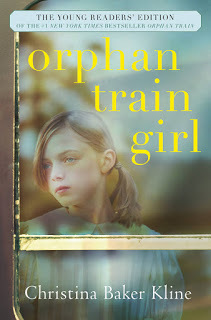
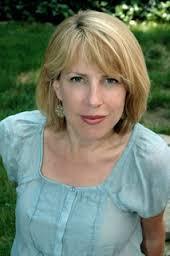
I love Christina Baker Kline. (Come on, who doesn't?) She's warm, funny and one of the most supportive friends I have. Plus, she gives great advice about writing and she loves Lazy Rivers! But Christina is not only the #1 NYT Bestselling author of Orphan Train and A Piece of the World, she's also the author of Sweet Water, The Way Life Should Be and Bird In Hand. I'm delighted to host her here--and Christina, I'm still finishing up those knitted mitts for you!
Why make a younger version of your #1 New York Times bestselling novel Orphan Train?
Wherever I go, I meet mothers and fathers who are reading Orphan Train alongside their teenagers. Often they tell me they wish their younger children could read it too. School administrators who’ve assigned Orphan Train for school- and district-wide reads have struggled to find a companion text for their upper-elementary and middle schools. So I began to contemplate writing a younger version of the book that parents and caregivers could read with their children, teachers and librarians could share with their students, and school districts and communities could present as part of their “One Book” reads of Orphan Train.
I’m so glad that a younger audience will have the experience of reading Vivian’s and Molly’s stories – and that they’ll learn about this important but little-known piece of American history.
How different did it feel to write Orphan Train Girl? Was there ever a moment that totally surprised you? Did you regret anything you had to leave out? (Or add in?)
I had never written a book for young readers, so I was lucky to have some expert help. Adapting the book presented some challenges. A number of aspects of the adult book are too disturbing for young readers. Molly, the 17-year-old protagonist in Orphan Train, is rebellious; some things that happen to Niamh, the nine-year-old train rider, are inappropriate. However, though some of the language and occurrences were toned down for Orphan Train Girl, most of the major incidents in the adult book are represented.
What do you hope younger readers will learn from the book? How do you want them changed?
I hope young readers will gain perspective on what it feels like to be a poor and unwanted child in America, a hundred years ago and today. I knew that if I could get the story right, kids would relate to Molly’s spunk and Niamh’s stamina. They would also find plenty to think and talk about in the story, which – like Orphan Train – contrasts Molly’s present-day experience as a foster kid with Vivian’s experience as an Irish immigrant in 1929.
How strange did it feel to change the points of view – and how did you change them?
Once I began developing the middle-grade story, the younger version of Molly took on a life of her own. I shifted the emphasis to Molly’s perspective and changed her age from 17 to 12, but the central plot arc – the friendship between Vivian and Molly – is still the backbone of the story. Vivian’s arc ends once she settles with the Nielsens at age 10. It was important to me to retain the tone and feel of Orphan Train. The books are designed to be read alone or side-by-side.
Any feedback from young readers yet?
Librarians, teachers, and young readers seem enthusiastic! There’s so much in the book for young readers to discuss.
Published on April 27, 2017 13:15
Self-appointed "peace and justice rabble-rouser" Ellen Meeropol talks about her stunning new book KINSHIP OF CLOVER, family, politics and so much more
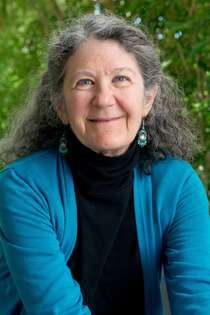
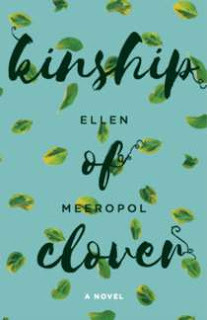
How can you not like someone who calls herself "a peace and justice rabble-rouser?" Ellen Meeropole the author of On Hurricane Island and House Arrest and numerous essays and stories, is here to talk about her haunting new novel., Kinship of Clover, about love, family and yes, politics. Thank you, Ellen, for being here!
I always wonder where the idea for a book comes from? What was haunting you?
Actually, a character from my first novel was haunting me. Pestering me, really. Jeremy was nine years old in House Arrest, and at the end of that book he was left in a vulnerable place. The cult he grew up in had fallen apart and his father went to prison. “Don’t you want to know what happened to me?” he kept whispering. I did want to know. That interest sparked the new novel.
All I knew of Jeremy when I started writing was his nine-year-old self. He had a twin brother and they lived with their mom. Jeremy was the sensitive twin, who had loved to hang out in the family greenhouse and draw plants. Eleven years later, in the new novel, his interest has become an obsession with disappearing plant species.
Like Jeremy, I am haunted by the rapid destruction of our planet and the apparent lack of will on the part of the human species to make the change necessary to turn things around. To write this novel, I re-imagined this character as a college Botany major. As I wrote, Jeremy’s beloved endangered and disappeared plants took on lives of their own and became active players. That totally surprised me, but it felt true to Jeremy and his story.
For you, it feels like the political is very, very personal, especially in this novel. Can you talk about this please?
The political is very personal to me. I’ve been interested in social justice since high school, active in civil rights and anti-war groups. In college, I fell in love with Robby Meeropol, who turned out to be the younger son of Ethel and Julius Rosenberg. I have never been tempted to write fiction about the Rosenberg case, but the themes raised by Robby’s family story and my own political past have always pushed their way into whatever narratives I write. As a writer, and as a reader, I’m fascinated by stories that illuminate injustice, that explore our world through very different perspectives, and that imagine a different kind of society. In today’s world, issues of global warming and climate justice feel critically important to me.
In the new novel, both Jeremy and his girlfriend’s grandmother, Flo, are acutely aware of the potential costs of political activism. Jeremy’s family, an oddball collection of outsiders who were harassed by law enforcement, paid a heavy price for being different. Flo, a lifelong activist and rabble-rouser, wants to share her knowledge and experience with young people. She has suffered consequences of choices that are outside the mainstream of our society and now faces dementia. Jeremy and Flo, separated in age by over fifty years, share a perspective about fighting injustice and very personal knowledge of the costs that can come with the territory. I think political struggle is always personal. As we fight against racism, poverty, and repression, we are still people first. We’re parents and grandparents and children and neighbors, trying to take care of each other and facing difficult questions about how to balance those competing demands. For me, fiction is a way to dramatize those conflicts, to explore those thorny questions with our heads and our hearts.
What kind of writer are you? Do you scribble on legal pads, or only use your trusty computer?
I mostly write on my computer. My brain moves quickly and my memory isn’t so great. I have to capture thoughts quickly, before they’re gone, and my fingers type faster than they write. That said, I have notebooks filled with images and observations and questions and descriptions. Some of my best ideas come when I’m walking, outside or on the treadmill, and I’ve learned to stop and jot notes (or send emails) to myself.
What’s obsessing you now and why?
I’m still very much obsessed with climate justice, even more now that we seem to be moving backwards in addressing these issues. My current manuscript, which I’ve been working on for 17 years, moves with two sisters from anti-war and feminist activism in 1968 to a crisis of politics and climate change in the near future.
What question didn't I ask that I should have?
The only thing I might add is that I am grateful to you, and to the extended community of writers and readers and booksellers and libraries for the response to the heightened dangers of today’s world. As a literary arts community, it’s crucial that we continue to work together to resist the social and political injustices around us, from loss of funding to critical environmental, arts, and social welfare organizations to heightened danger to our most vulnerable sisters and brothers. As writers and as humans who live on this world, let us be bold and brave in our writing and our activism.
Published on April 27, 2017 13:14
Despite protestations to the contrary, climate change is killing out planet. Acclaimed writer Connie May Fowler talks about her gripping new memoir, A MILLION FRAGILE BONES, the greed that causes planet devastation, fighting back and more
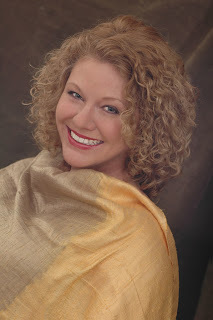
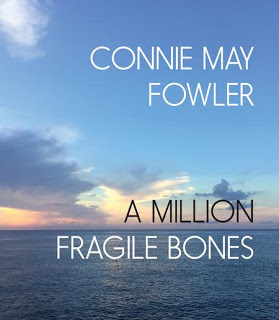
"A Million Fragile Bones stands as testament to the devastation caused by the greed and irresponsibility that lead to environmental disasters, to all creatures, human and otherwise."~~Tampa Bay Times
"Fowler’s elegy to her lost home and chronicle of BP’s criminal negligence and the toxic decimation of this coastal haven is uniquely intimate and affecting in its precise elucidation of this tragic, largely invisible apocalypse, offering powerful testimony to the unacceptable risks and profound consequences of reckless oil drilling."~~Booklist
Connie May Fowler is the kind of person that when I think about her, I want to hug her. She's so hysterically funny, with a huge heart, deeply thoughtful and brilliantly talented. She, of course, is an award-winning novelist, memoirist, screenwriter, and teacher. Her most recent book, A Million Fragile Bones, is a memoir that details her experience during the Gulf oil spill and explores the close ties between place, spirituality, family, and environmental devastation. And it's a knockout. She's written six other novels, How Clarissa Burden Learned to Fly, Sugar Cage, River of Hidden Dreams, The Problem with Murmur Lee, Remembering Blue and Before Women had Wings, recipient of the 1996 Southern Book Critics Circle Award and the Francis Buck Award from the League of American Pen Women. Three of her novels have been Dublin International Literary Award nominees. Connie adapted Before Women had Wings for Oprah Winfrey. The result was an Emmy-winning film starring Ms. Winfrey and Ellen Barkin.
But wait--you have to know this. In 2007, Connie performed in New York City at The Player’s Club with actresses Kathleen Chalfont, Penny Fuller, and others in an adaptation based on The Other Woman, an anthology that contains her essay “The Uterine Blues.” And while Connie was performing, I was in the front row and she told me later, that when the actress portraying me read my piece, my face was a tangled map of emotion. In 2003, Connie performed in The Vagina Monologues alongside Jane Fonda and Rosie Perez in a production that raised over $100,000 for charity.
Connie, thank you, thank you, thank you, and hugs.
I always want to know the “why now” moment? Why did it feel like you had to write this particular memoir right now.
A Million Fragile Bones has had a strange journey. It began as a sort of idyll, an homage, to this incredible place I lived—a narrow spit of land, a sandbar really, that juts into the northern Gulf of Mexico. Think Pilgrim at Tinker Creek meets the sea.
For nearly twenty years, I lived a rare life, one immersed in nature, one in which I could easily avoid people if that’s what I chose. So, I began playing around with the idea, poking at the edges, figuring out what drew me to this place, and then the BP oil spill happened, destroying so much of what I held sacred.
I survived the horror through writing, so this is a memoir largely written in real time. Suddenly I felt anew the urgent call to bear witness. I felt a duty to record the destruction and the truth so that possibly such a disaster would never happen again.
But now, with the new administration calling for drilling throughout the gulf, and with no significant safety improvements in place, the memoir feels not only like an act of bearing witness but a call to arms.
The BP oil spill impacted 68,000 miles of ocean and also washed ashore. But not only did this devastate the area you loved, but you were grappling with your own inner devastation as well. How in the world did you manage to get through this? Did anger towards the corporate greed responsible for this travesty help at all?
I suppose anger is a galvanizing force, but also, this was my sacred space being destroyed. How does one not stand up to that?
There were days, however, that were very bleak, days that I questioned my sanity and well-being. As we witnessed day by day the situation grow ever worse, BP’s PR machine bustled along in full force, essentially claiming we weren’t experiencing what we thought we were experiencing. It was a form of corporate gas-lighting. And then there were all the dead and dying animals, the water that began to move as if it were heavy because it was laden with oil, so inevitably the anger turned righteous. Righteous anger can move mountains. And it can help you maintain your bearings in a world suddenly awash in chaos and sadness.
I loved that you wrote that you are still searching for your father who died decades ago. That says something so profound to me about grief—that it never goes away. It just changes. Can you talk about this please?
This was one of the most surprising things to me. As I said, before the spill I thought I was writing a book about my love for nature and a specific place in nature. But even then, in those early days, my father kept cropping up. I was like, “What are you doing here?” And then, as writers should, I just went with it, trusting he was there for a reason and I would eventually figure it out.
In the wonderful, mysterious act we call writing, I realized anew that I was still grieving, still missing, still madly loving the man who had died when I was six.
Loss is not an empty space. It is filled with all the love and longing we possess. Perhaps that is why grief is such a powerful force in our lives and why, rather than denying it or trying to push it down, we need to embrace it.
So much of this wonderful memoir is a call to arms, a plea for everyone to pay better attention to our planet. (And to themselves). What is the one best thing people can do?
A few months ago, I might have had a different answer. But now, I fervently believe the best thing we can do is vote into office—from dog catcher up to the White House—people who believe in science. We simply cannot afford to have climate change deniers in charge of our country. Nor can we afford to have EPA protections rescinded and funding gutted. I heard today that the administration is considering rolling back regulations on lead. Lead. What’s next? DDT?
For the life of our planet and for the well-being of every living thing on earth—human, plant, animal—we cannot let greed and ignorance rule the day. Science, not opportunistic deal peddling, is the only thing that is going to save us.
What’s obsessing you now and why?
Climate change. It is the greatest danger we face. Already, it has thrust us into the Sixth Great Extinction. How horrible to live in a time in which species are vanishing from the planet! How do we not do anything about that? How do our hearts not break?
Ocean levels are rising precipitously. The ice cap is melting. Earth is getting hotter. Droughts are commonplace. Storms are growing more intense. We face a future of global food shortages and, therefore, mass migrations. And yet, it seems that Nero is fiddling while all of Rome burns. What question didn’t I ask that I should have?
How is life in Mexico?
I can say, I have been here for just over a year and am loving this new chapter in my life. There are lots of challenges—language proficiency and the frequent, necessary trips back to the U.S. can be trying—but neither of those things are deal breakers. Indeed, I love being immersed in a new language and culture, and I’m getting used to dealing with the intricacies of moving across borders.
This place feels both ancient and fresh to me. I am learning so much. People here are sweet and generous. They care about family, about the heart and soul of things, in a way that I have never before experienced. I am gardening again. Digging in the soil of a foreign land and harvesting its gifts—tomatoes, basil, squash, avocado, guañabana, mamey, papaya, chaya—makes me feel as if I have come home.
Published on April 27, 2017 13:02
April 25, 2017
Pulitzer Prize-Winning Elizabeth Strout talks about why the work matters more than prizes, why she brought back Lucy Barton in ANYTHING IS POSSIBLE, how she writes and so much more.
<!-- /* Font Definitions */ @font-face {font-family:"MS 明朝"; mso-font-charset:78; mso-generic-font-family:auto; mso-font-pitch:variable; mso-font-signature:-536870145 1791491579 18 0 131231 0;} @font-face {font-family:"Cambria Math"; panose-1:2 4 5 3 5 4 6 3 2 4; mso-font-charset:0; mso-generic-font-family:auto; mso-font-pitch:variable; mso-font-signature:-536870145 1107305727 0 0 415 0;} @font-face {font-family:Cambria; panose-1:2 4 5 3 5 4 6 3 2 4; mso-font-charset:0; mso-generic-font-family:auto; mso-font-pitch:variable; mso-font-signature:-536870145 1073743103 0 0 415 0;} /* Style Definitions */ p.MsoNormal, li.MsoNormal, div.MsoNormal {mso-style-unhide:no; mso-style-qformat:yes; mso-style-parent:""; margin:0in; margin-bottom:.0001pt; mso-pagination:widow-orphan; font-size:12.0pt; font-family:Cambria; mso-fareast-font-family:"MS 明朝"; mso-bidi-font-family:"Times New Roman";} .MsoChpDefault {mso-style-type:export-only; mso-default-props:yes; font-size:10.0pt; mso-ansi-font-size:10.0pt; mso-bidi-font-size:10.0pt; font-family:Cambria; mso-ascii-font-family:Cambria; mso-fareast-font-family:"MS 明朝"; mso-hansi-font-family:Cambria;} @page WordSection1 {size:8.5in 11.0in; margin:1.0in 1.25in 1.0in 1.25in; mso-header-margin:.5in; mso-footer-margin:.5in; mso-paper-source:0;} div.WordSection1 {page:WordSection1;} </style><br /><div class="MsoNormal"><br /><div class="separator" style="clear: both; text-align: center;"><a href="https://4.bp.blogspot.com/--bY5vxYXvK..." imageanchor="1" style="margin-left: 1em; margin-right: 1em;"><img border="0" height="320" src="https://4.bp.blogspot.com/--bY5vxYXvK..." width="216" /></a></div><br /><div class="separator" style="clear: both; text-align: center;"><a href="https://4.bp.blogspot.com/-0qSFqyyQm7..." imageanchor="1" style="margin-left: 1em; margin-right: 1em;"><img border="0" height="320" src="https://4.bp.blogspot.com/-0qSFqyyQm7..." width="320" /></a></div><br /><span style="font-family: Arial,Helvetica,sans-serif;"><span style="font-size: small;"><br /></span></span><span style="font-family: Arial,Helvetica,sans-serif;"><span style="font-size: small;"><br /></span></span><span style="font-family: Arial,Helvetica,sans-serif;"><span style="font-size: small;"><b>"In her latest work, Strout achieves new levels of masterful storytelling." Starred Review, Publisher's Weekly</b></span></span><br /><span style="font-family: Arial,Helvetica,sans-serif;"><span style="font-size: small;"><br /></span></span><span style="font-family: Arial,Helvetica,sans-serif;"><span style="font-size: small;"><i>I first heard about Elizabeth Strout when Amy and Isabelle came out, and I was totally gobsmacked by the brilliance of the novel. I've been devouring everything she writes since, and a few novels back, I gathered up the courage to write to her and ask if she would read and blurb my novel. AND SHE DID. How generous and amazing is that? I remember the week before she won the Pulitzer, I took courage in hand and wrote her again because I had finished and loved another book and I wanted to tell her. Again, she was so thoughtful, so gracious, and she didn't for a minute seem to believe she would win the Pulitzer. Prizes, as you'll read here, don't matter to her. The work does.</i></span></span><br /><span style="font-family: Arial,Helvetica,sans-serif;"><span style="font-size: small;"><br /></span></span><span style="font-family: Arial,Helvetica,sans-serif;"><span style="font-size: small;"><i><br /></i><i> <a href="http://www.elizabethstrout.com/"... Strout </a>won the <a href="https://en.wikipedia.org/wiki/Pulitze..." title="Pulitzer Prize for Fiction">Pulitzer Prize for Fiction</a> for <a href="https://en.wikipedia.org/wiki/Olive_K..." title="Olive Kitteridge">Olive Kitteridge</a>, which wasadapted into an <a href="https://en.wikipedia.org/wiki/HBO" title="HBO">HBO</a> miniseries that won six Emmys. Her other award-winning novels include <a href="https://en.wikipedia.org/wiki/Amy_and..." title="Amy and Isabelle">Amy and Isabelle</a>, <a href="https://en.wikipedia.org/wiki/Abide_w..." title="Abide with Me (novel)">Abide With Me</a>, <a href="https://en.wikipedia.org/wiki/Olive_K..." title="Olive Kitteridge">Olive Kitteridge</a>, <a href="https://en.wikipedia.org/wiki/The_Bur..." title="The Burgess Boys">The Burgess Boys</a>, <a href="https://en.wikipedia.org/wiki/My_Name..." title="My Name Is Lucy Barton">My Name Is Lucy Barton</a> and Anything is Possible. Her book, Amy and Isabelle was adapted as a television movie, starring <a href="https://en.wikipedia.org/wiki/Elisabe..." title="Elisabeth Shue">Elisabeth Shue</a> and produced by <a href="https://en.wikipedia.org/wiki/Oprah_W..." title="Oprah Winfrey">Oprah Winfrey</a>'s studio, <a class="mw-redirect" href="https://en.wikipedia.org/wiki/Harpo_F..." title="Harpo Films">Harpo Films</a>.</i></span></span><br /><span style="font-family: Arial,Helvetica,sans-serif;"><span style="font-size: small;"><br /></span></span><span style="font-family: Arial,Helvetica,sans-serif;"><span style="font-size: small;"><br /></span></span><span style="font-family: Arial,Helvetica,sans-serif;"><span style="font-size: small;"><i> I'm absolutely honored that she agreed to let me interview her. Thank you, thank you, thank you, Elizabeth. </i></span></span><br /><span style="font-family: Arial,Helvetica,sans-serif;"><span style="font-size: small;"><br /></span></span><span style="font-family: Arial,Helvetica,sans-serif;"><span style="font-size: small;"><br /></span></span><span style="font-family: Arial,Helvetica,sans-serif;"><span style="font-size: small;"><br /></span></span><span style="font-family: Arial,Helvetica,sans-serif;"><span style="font-size: small;"><b> I absolutely loved Anything is Possible. Why did you bring back Lucy Barton?</b></span></span><br /><span style="font-family: Arial,Helvetica,sans-serif;"><span style="font-size: small;"><br /></span></span><span style="font-family: Arial,Helvetica,sans-serif;"><span style="font-size: small;"> You know, I really wasn’t sure about Lucy in this novel.<span style="mso-spacerun: yes;"> </span>I just wasn’t sure what to do with her.<span style="mso-spacerun: yes;"> </span>I wanted her there, but I didn’t want to tarnish her voice from <i style="mso-bidi-font-style: normal;">My</i><i style="mso-bidi-font-style: normal;">Name</i> <i style="mso-bidi-font-style: normal;">is</i> <i style="mso-bidi-font-style: normal;">Lucy</i> <i style="mso-bidi-font-style: normal;">Barton</i>.<span style="mso-spacerun: yes;"> </span>So I played around with a few different things, and they didn’t work, and I almost gave up on her for this book.<span style="mso-spacerun: yes;"> </span>But then I thought: Oh, if I just <i style="mso-bidi-font-style: normal;">show</i>her, without getting into her head – and that story is all third person Pete’s point of view – then I thought, That may work.<span style="mso-spacerun: yes;"> </span>And so I decided to do it that way, to keep the camera sort of far away from her in a way.<span style="mso-spacerun: yes;"> </span>If you see what I mean.</span></span></div><div class="MsoNormal"><span style="font-family: Arial,Helvetica,sans-serif;"><span style="font-size: small;"><b><br /></b></span></span></div><div class="MsoNormal"><span style="font-family: Arial,Helvetica,sans-serif;"><span style="font-size: small;"><b>I'm fascinated by how writers write. How do you?</b></span></span><br /><span style="font-family: Arial,Helvetica,sans-serif;"><span style="font-size: small;"><br /></span></span><span style="font-family: Arial,Helvetica,sans-serif;"><span style="font-size: small;">I never map things out.<span style="mso-spacerun: yes;"> </span>My head just doesn’t work that way.<span style="mso-spacerun: yes;"> </span>In truth, I’m not sure how it works, but I do know that I never write anything from beginning to end, not a story, not a book, nothing do I do from start to finish.<span style="mso-spacerun: yes;"> </span>So I might be working on various parts of Mississippi Mary and also working on the story “Windmills” at the same time, and then I will finally focus in on one and get it finished, and then as I get more of the book done, I think, Mmmmm, maybe I will try the janitor who used to know her as a kid<span style="mso-spacerun: yes;"> </span>---<span style="mso-spacerun: yes;"> </span>The only ritual I have to keep me going is the desire to try and make it good.</span></span></div><div class="MsoNormal"><span style="font-family: Arial,Helvetica,sans-serif;"><span style="font-size: small;"><br /></span></span></div><div class="MsoNormal"><span style="font-family: Arial,Helvetica,sans-serif;"><span style="font-size: small;">I am self-taught as a writer, except for a course I took many years ago with Gordon Lish.<span style="mso-spacerun: yes;"> </span>And I think this helped me.<span style="mso-spacerun: yes;"> </span>His course helped me, but the many many years that I worked on my own, I think they helped me.<span style="mso-spacerun: yes;"> </span>Because I was not influenced by a way of doing things.<span style="mso-spacerun: yes;"> </span>But it took me a very long time to find my voice.<span style="mso-spacerun: yes;"> </span>I came to depend almost entirely on my ear – on the way the sentences sound.<span style="mso-spacerun: yes;"> </span>Do they sound true? Do they have a pulse beneath them?<span style="mso-spacerun: yes;"> </span>I also learned early on to have no judgment about my characters; I love them all, no matter badly how they behave.<span style="mso-spacerun: yes;"> </span>And then my mind just works in a certain way, so I think that <i style="mso-bidi-font-style: normal;">Olive</i> <i style="mso-bidi-font-style: normal;">Kitteridge</i> and <i style="mso-bidi-font-style: normal;">Anything</i> <i style="mso-bidi-font-style: normal;">is</i> <i style="mso-bidi-font-style: normal;">Possible</i> reflect that particular way my mind works.</span></span></div><div class="MsoNormal"><span style="font-family: Arial,Helvetica,sans-serif;"><span style="font-size: small;"><br /></span></span></div><div class="MsoNormal"><span style="font-family: Arial,Helvetica,sans-serif;"><span style="font-size: small;"><b>I remember you once saying that you were not thinking about the Pulitzer, you were thinking about your work. I loved that. Did winning change your life or your writing?</b></span></span><br /><span style="font-family: Arial,Helvetica,sans-serif;"><span style="font-size: small;"><br /></span></span><span style="font-family: Arial,Helvetica,sans-serif;"><span style="font-size: small;">You are right that for me, it is only the work that matters.<span style="mso-spacerun: yes;"> </span>This has always been true.<span style="mso-spacerun: yes;"> </span>When I won the Pulitzer, I was surprised and very happy, but I don’t feel it changed my life in any personal way.<span style="mso-spacerun: yes;"> </span>Professionally, it brought me many new readers, and I am so glad about that – but now I owe them a responsibility as I have always owed all my readers.<span style="mso-spacerun: yes;"> </span>So there was a bit of a sense of that, more responsibility, but I was very glad to win it.<span style="mso-spacerun: yes;"> </span>And because I have always had that sense of responsibility to my readers, that didn’t change.<span style="mso-spacerun: yes;"> </span>I would write as well as I could for one reader, or one hundred.</span></span></div><div class="MsoNormal"><span style="font-family: Arial,Helvetica,sans-serif;"><span style="font-size: small;"><br /></span></span></div><div class="MsoNormal"><span style="font-family: Arial,Helvetica,sans-serif;"><span style="font-size: small;">It almost feels like with each book I am starting once more to learn how to write, but that isn’t really true.<span style="mso-spacerun: yes;"> </span>The more I have written the more I understand a sentence, that is what’s true.<span style="mso-spacerun: yes;"> </span>But each book feels different because each book <i style="mso-bidi-font-style: normal;">is </i>different, and it has to be, because form is substance, so the way the story is told -- is the story itself.<span style="mso-spacerun: yes;"> </span><i style="mso-bidi-font-style: normal;">The</i> <i style="mso-bidi-font-style: normal;">Burgess</i><i style="mso-bidi-font-style: normal;">Boys</i>, for example, required a far more traditional type of story- telling technique because of the story it tells.</span></span></div><div class="MsoNormal"><span style="font-family: Arial,Helvetica,sans-serif;"><span style="font-size: small;"><b><br /></b></span></span></div><div class="MsoNormal"><span style="font-family: Arial,Helvetica,sans-serif;"><span style="font-size: small;"><b>What question didn't I ask that I should have</b>?</span></span><br /><span style="font-family: Arial,Helvetica,sans-serif;"><span style="font-size: small;"><br /></span></span><span style="font-family: Arial,Helvetica,sans-serif;"><span style="font-size: small;">One question I would liked to have been asked is about class in my work.<span style="mso-spacerun: yes;"> </span>I think class plays a part in every book I’ve written, starting with <i style="mso-bidi-font-style: normal;">Amy</i><i style="mso-bidi-font-style: normal;">and</i> <i style="mso-bidi-font-style: normal;">Isabelle</i>, and the fact that at the start of the book Isabelle thinks she is superior to the women who work in the office room at that mill.<span style="mso-spacerun: yes;"> </span>And then each of my books handles class a different way.<span style="mso-spacerun: yes;"> </span><i style="mso-bidi-font-style: normal;">My</i> <i style="mso-bidi-font-style: normal;">Name</i><i style="mso-bidi-font-style: normal;">is</i> <i style="mso-bidi-font-style: normal;">Lucy</i> <i style="mso-bidi-font-style: normal;">Barton</i> pushes it to the extreme, but I only mention this because I do think class remains something Americans don’t quite know how to talk about, but it is there in my books.<span style="mso-spacerun: yes;"> </span>And I think class is not just income or education level, but more a sense of power or powerlessness that a person has as they live their life.</span></span></div><div class="MsoNormal"><span style="font-family: Arial,Helvetica,sans-serif;"><span style="font-size: small;"><br /></span></span></div><div class="MsoNormal"><span style="font-family: Arial,Helvetica,sans-serif;"><span style="font-size: small;">Thank you so much!</span></span></div>
Published on April 25, 2017 11:12
A vanished teenaged girl, a dead body, and a lonely community. Bryn Chancellor talks about her superlative novel SYCAMORE.
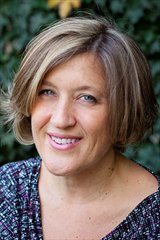
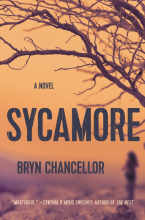
"Riveting. . . .This is a movingly written, multivoiced novel examining how one tragic circumstance can sow doubt about fundamental things. . . . a transporting vision of community, connection, and forgiveness." — Publishers Weekly (Starred review, Pick of the Week)
What's more wonderful than discovering a novel that keeps you up at night and haunts you through the day? That describes Bryn Chancellor's Sycamore, about the discovery of a body that might belong to a vanished teenaged girl, a community pulling together and apart, and secrets.
Bryn Chancellor’s story collection When Are You Coming Home? won the 2014 Prairie Schooner Book Prize, and her short fiction has appeared in a range of publications, including Gulf Coast, Blackbird, Colorado Review, Crazyhorse, and Phoebe. She was also awarded the 2014 Poets & Writers Maureen Egen Writers Exchange Award for fiction, and literary fellowships from the Alabama State Council on the Arts and the Arizona Commission on the Arts. She has an MFA in fiction from Vanderbilt University and teaches at the University of North Carolina at Charlotte.
I always think that writers are haunted to write the book they need to write. Was it this way for you?
Oh, haunted—that’s a lovely way to capture the sense of urgency to write, and yes, that was true for this one. This makes me think of what Joan Didion says in “Why I Write” about the pictures in her mind, the “images that shimmer around the edges.” I know I’m in the clutches of new work when those ghostly shimmers arrive. I wake with them behind my eyes. In the case of Sycamore, it took me awhile to pay attention to them because I had been wrestling with a different novel (one that’s in a drawer now). In my frustration, I started writing what I thought were stories. I wanted to go back to the short form; I missed it for the precision, the intense focus, the unity of effect. I also wanted to just finish something. Then Jess kept popping up, and I was like, Ah, hell, this is a novel! I finally stopped worrying about what it was or would be and let myself be seized by what had been hovering at my door: this place (based on my hometown region in Arizona), these wounded characters, this mystery. I got down the first mess of a draft in one month—and I never write that fast. Partly it was that I was at a residency, but partly it was that I finally let the ghosts in. (Of course, the revising took another eight months and multiple drafts, and then more revising through the editorial process.)
I’m really partial to debuts and this one is already getting a lot of attention. What’s that like for you? Does it put more pressure on you for the next book, or do you feel validated and happy? (Ha! What writer ever feels validated and happy!)
Ha indeed! Yeah, attention can be hard for me. I’m not a person who likes to be “out there,” as a dear friend once noted at a party as I kept stepping out of the center of the room and backing into a corner. I just read an article about why cats like to squeeze into boxes and squares (oh, Internet)—little hidey-holes of sanctuary to huddle in—and I was like, Yep, I get it, cats. I get it. These past months have been a bit of an emotional tumult: One day I’m ecstatic and full of wonder and the next I’m terrified, paralyzed by my old pal self-doubt. To mix my animal metaphor, I end up like a poodle whose people come home with treats when the postal carrier rings the bell and a storm rolls in. I yip, jump, pant, flop over for belly scritches, and nearly piddle. If someone could get me a thundershirt—or maybe just a box, actually—that would be great.
One constant, though, is gratitude. For my agent, editor, and whole publishing team, for readers, for booksellers, for librarians, for other writers and artists—all the hardworking people who love books and fight for them. Not to mention all my family and friends rooting for me. Lots of honey in this hive.
I don’t feel pressure—not yet anyway—about the next project, but it’s true I’m having trouble settling into writing, untangling the psychic knots. I’m trying to work through it by scribbling a lot of notes, talking walks, staying off the Internet (except cat news). I woke up yesterday thinking about a character, so that’s a good sign.
I think people love secrets because there is always a story attached to them—just one we have not unfolded yet, and most often, the reveals are reversals of everything we ever thought or felt. When you were writing the first few drafts, did you know the answer to the question of what really happened to that missing teenaged girl, or did you think you knew and it changed, and did it come as a completely surprise?
You’re so right about that intertwined nature of secrets and the unexpectedness of the revelation—I love that in stories. And your question about solving the mystery in Sycamore is spot on: I didn’t know what had happened, and then what I thought I knew kept shifting. I certainly hadn’t planned for a character to find bones; those cropped up mid-story and I was like, Um, what the heck is this? I tested out several possibilities as I explored more about my characters until the right solution pushed its way through. Once I determined the truth, I had to go back in to try to add clues without tipping my hand. Such uncertainty might drive some writers up the wall, but for me puzzling out answers is one of the great joys of writing.
So much of Sycamore is about small-town life. How do you imagine this scenario might have played out in say, Manhattan today?
In some ways, I don’t see cities, even large ones such as Manhattan or L.A. or Chicago, as that different from small-town life. Tight-knit, intimate communities, with particular identities and atmospheres, form spatially within the larger whole—apartment buildings, blocks, neighborhoods, religious and community centers, schools, diners, parks. Often when I’ve overheard New Yorkers talk about their place, they ask and tell each other very specific cross-streets. I lived in Phoenix for over a decade, and then in Nashville, and now in Charlotte, and it’s the same. So if I were to set this kind of story—one that depends on individual and communal memory—in a city, I suspect I’d go to one of those microcosms.
But the more I ponder it, Sycamore for me also is a book in which the characters and place are inextricably bound. I don’t know that every story acts this way, but in this case to change the place upends everything—the characters’ experiences and trajectories and work lives, the how and why of events. I can’t imagine it taking place anywhere else. I tried at first, actually. I was living in a small college town in Alabama when I started the stories, and I tried that to use that place, but I couldn’t get inside it. So I took it home, to a landscape that I had moved around in for more than thirty years—albeit to a fictionalized version, which allowed me distance to rearrange and create features and timelines that I needed.
This gets back to the haunting. I rarely set stories in my hometown area, so that place was one of the ghosts lurking in the doorway. Only now, here in middle age, was I ready to go to that place of childhood in my writing.
What’s obsessing you now and why?
I’m thinking a lot about wildfires, which might become part of my next project. My desktop picture right now is set to a satellite image of the burn scar from the 2002 Rodeo-Chediski fire in Arizona. I was working at a newspaper during that time and the images all these years later stay with me—shimmer, I dare say. I keep staring at this particular image, trying to discover what I see in it, hoping to unlock something.
What question didn’t I ask that I should have?
This was wonderful—thank you for taking the time to read and to talk with me about the book!
Published on April 25, 2017 10:56
What would you do if you were a brand new mother and your baby had a mysterious illness that modern medicine couldn't seem to diagnose? Elizabeth Silver talks about her gorgeous new memoir (OUT TODAY!) The Tincture of Time, why travel is like medicine, unc
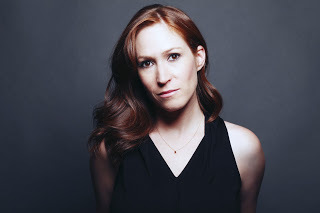
[image error]
I first met Elizabeth Silver through her incredible novel The Execution of Noa. P. Singleton. I sought her out and we became friends, and she sent me her new memoir and I was both exhilarated and on edge and terrified whether medicine would figure out what was wrong with her new baby and enthralled and fascinated reading it. The memoir is astonishing, about life and uncertainty and waiting and it is profound and out today. Go get it.
And thank you Elizabeth for being here, for your amazing work, and for being my friend.
Was it terrifying or cathartic to relive what you went through?
Writing this book was at once painful and cathartic, but by pulling the curtain back on the general concept of uncertainty in medicine, it helped me contextualize what was happening by extending the narrative far beyond my story to those of countless others.
I interviewed dozens of experts and individuals experiencing medical uncertainty, and though only a handful of their stories made it into the book, our discussions will stay with me forever. Many faced long-term, ongoing uncertainty, which invariably turned their chronic uncertainty into the only known variable, while others shifted my perspective on what uncertainty is, what a medical crisis is, and helped me understand where I fall in the spectrum.
While conducting interviews, I realized that uncertainty in medicine is, in many ways, a litmus test for how people view the world. I ended each interview with a fast association test for the gut reaction to the phrase, “medical uncertainty.” The most frequent response was “fear,” with “powerlessness” and “frustration” a close second, all words sharing a particular connotation. Sure, there were a handful of responses in the positive realm, such as “challenge” and “discovery,” but broadly speaking, it was a concept that left people needing something; something comforting, something healing, something…more.
How difficult was this to write? Did you have moments when you just had to stop writing, or you ached to fictionalize things?
Though I loved and hated writing this book, I never wanted to fictionalize things. I would have taken what I was learning and perhaps made meaning of it through fiction if that was the case. I had an intense need to capture my life and a particular truth about it at that time that I definitely did not want to fictionalize. Of course, all of writing is perspective, but I needed to write this book in order to live past the times in it. I needed to write this book in order to get back to fiction, which is what I’m writing again now.
There's a great deal of fascinating medical research in the book which reminds us that we--and doctors--don't know everything. Maybe we don't know anything. How best can we live with this idea?
In many ways, I think medicine is like travel. The more you travel, the more you realize you haven’t traveled enough. The same is true with medicine. The more we know, the more we realize we don’t know. We can live with this idea by accepting that if even the scientists – the people who are trained to view the world with a clear and often provable hypothesis – must accept uncertainty as part of life, then we also must accept it. There are elements of our life we can control – so let’s focus on those in whatever way we can find it. Maybe you focus on the moving variable through religion, through creativity, through another form of control, while you somehow allow the constant variable – the unknown in medicine – to be present. It will always be there.
There's so much about time here, too, that it can soothe, release stress, show us the truth. But time can also really wear you down, make it impossible to believe that there will ever be a happy ending. How did you deal with time while you were struggling to understand what had happened to your baby?
In many ways, time stopped for me. I was a brand new mother still recovering from a Cesarean, trying to learn how to breastfeed, while navigating doctors, scans, physical therapists and the projections of others. But this wasn’t anything exceptional or new. This happens every day for women and is all the more pronounced in NICUs, where the stakes are higher. I think time stops, soothes, and evolves during these heightened moments of anticipation – be it the joy of new parenthood or the fear of losing that new identity.
During the endless waiting, I consumed memoirs and french fries on an almost daily basis. I ate and I read, I read and I ate. I pumped breast milk round the clock because it was really my only semblance of control, the only thing I felt I could do to help.
This exquisite memoir is both terrifying and fascinating and in a way, exhilarating, because it gets at the beating heart of life. The way we cannot know what is going to happen in the next second. The way we must wait to see what can be revealed, or if it will be revealed. Can you talk about this please?
Thank you. I hope it is a representation of life – only under this particular set of circumstances. The book is divided into three parts: Acute Uncertainty, Sub-acute Uncertainty, and Chronic Uncertainty, taken from the three stages of illness in medicine. I found that if you apply your own uncertain medical crises to this rubric, in many ways it helps in this process of waiting to see what will be revealed. There will always be the initial moment of discovery, the rush to the hospital, the acute pain, followed by a waiting point or learning period as doctors and patients work together to find a diagnosis, prognosis, or treatment plan. Ultimately, there will be the chronic uncertainty that is simply life. If you never find answers, then the certain, ongoing variable is uncertainty and there is some comfort in that.
What question didn’t I ask that I should have?
These questions were amazing! Thank you so much for having me on your blog.
Published on April 25, 2017 08:43
April 19, 2017
A perfect lie. A perfect stranger. A perfect thriller. The amazing Lisa Scottoline talks about ONE PERFECT LIE
<!-- /* Font Definitions */ @font-face {font-family:Arial; panose-1:2 11 6 4 2 2 2 2 2 4; mso-font-charset:0; mso-generic-font-family:auto; mso-font-pitch:variable; mso-font-signature:-536859905 -1073711037 9 0 511 0;} @font-face {font-family:Times; panose-1:2 0 5 0 0 0 0 0 0 0; mso-font-charset:0; mso-generic-font-family:auto; mso-font-pitch:variable; mso-font-signature:3 0 0 0 1 0;} @font-face {font-family:"MS 明朝"; mso-font-charset:78; mso-generic-font-family:auto; mso-font-pitch:variable; mso-font-signature:1 134676480 16 0 131072 0;} @font-face {font-family:"MS 明朝"; mso-font-charset:78; mso-generic-font-family:auto; mso-font-pitch:variable; mso-font-signature:1 134676480 16 0 131072 0;} @font-face {font-family:Cambria; panose-1:2 4 5 3 5 4 6 3 2 4; mso-font-charset:0; mso-generic-font-family:auto; mso-font-pitch:variable; mso-font-signature:-536870145 1073743103 0 0 415 0;} /* Style Definitions */ p.MsoNormal, li.MsoNormal, div.MsoNormal {mso-style-unhide:no; mso-style-qformat:yes; mso-style-parent:""; margin:0in; margin-bottom:.0001pt; mso-pagination:widow-orphan; font-size:12.0pt; font-family:Cambria; mso-ascii-font-family:Cambria; mso-ascii-theme-font:minor-latin; mso-fareast-font-family:"MS 明朝"; mso-fareast-theme-font:minor-fareast; mso-hansi-font-family:Cambria; mso-hansi-theme-font:minor-latin; mso-bidi-font-family:"Times New Roman"; mso-bidi-theme-font:minor-bidi;} p.MsoFooter, li.MsoFooter, div.MsoFooter {mso-style-priority:99; mso-style-link:"Footer Char"; margin:0in; margin-bottom:.0001pt; mso-pagination:widow-orphan; tab-stops:center 3.0in right 6.0in; font-size:12.0pt; font-family:Cambria; mso-ascii-font-family:Cambria; mso-ascii-theme-font:minor-latin; mso-fareast-font-family:"MS 明朝"; mso-fareast-theme-font:minor-fareast; mso-hansi-font-family:Cambria; mso-hansi-theme-font:minor-latin; mso-bidi-font-family:"Times New Roman"; mso-bidi-theme-font:minor-bidi;} p.p1, li.p1, div.p1 {mso-style-name:p1; mso-style-unhide:no; mso-margin-top-alt:auto; margin-right:0in; mso-margin-bottom-alt:auto; margin-left:0in; mso-pagination:widow-orphan; font-size:10.0pt; font-family:Times; mso-fareast-font-family:"MS 明朝"; mso-fareast-theme-font:minor-fareast; mso-bidi-font-family:"Times New Roman"; mso-bidi-theme-font:minor-bidi;} span.s1 {mso-style-name:s1; mso-style-unhide:no;} span.apple-converted-space {mso-style-name:apple-converted-space; mso-style-unhide:no;} p.p2, li.p2, div.p2 {mso-style-name:p2; mso-style-unhide:no; mso-margin-top-alt:auto; margin-right:0in; mso-margin-bottom-alt:auto; margin-left:0in; mso-pagination:widow-orphan; font-size:10.0pt; font-family:Times; mso-fareast-font-family:"MS 明朝"; mso-fareast-theme-font:minor-fareast; mso-bidi-font-family:"Times New Roman"; mso-bidi-theme-font:minor-bidi;} span.FooterChar {mso-style-name:"Footer Char"; mso-style-priority:99; mso-style-unhide:no; mso-style-locked:yes; mso-style-link:Footer;} .MsoChpDefault {mso-style-type:export-only; mso-default-props:yes; font-family:Cambria; mso-ascii-font-family:Cambria; mso-ascii-theme-font:minor-latin; mso-fareast-font-family:"MS 明朝"; mso-fareast-theme-font:minor-fareast; mso-hansi-font-family:Cambria; mso-hansi-theme-font:minor-latin; mso-bidi-font-family:"Times New Roman"; mso-bidi-theme-font:minor-bidi;} @page WordSection1 {size:8.5in 11.0in; margin:1.0in 1.25in 1.0in 1.25in; mso-header-margin:.5in; mso-footer-margin:.5in; mso-paper-source:0;} div.WordSection1 {page:WordSection1;} </style><br /><div class="MsoNormal"><br /></div><div class="MsoNormal"><br /></div><div class="separator" style="clear: both; text-align: center;"><a href="https://1.bp.blogspot.com/-sW879LJHlS..." imageanchor="1" style="margin-left: 1em; margin-right: 1em;"><img border="0" src="https://1.bp.blogspot.com/-sW879LJHlS..." /></a></div><br /><div class="separator" style="clear: both; text-align: center;"><a href="https://2.bp.blogspot.com/-8kvnQqKgBG..." imageanchor="1" style="margin-left: 1em; margin-right: 1em;"><img border="0" height="320" src="https://2.bp.blogspot.com/-8kvnQqKgBG..." width="213" /></a></div><br /><div class="MsoNormal"><span style="font-size: small;"><i><br /></i></span></div><div class="MsoNormal"><span style="font-size: small;"><i>I am always excited to host the amazing Lisa Scottoline on the blog. Of course she is the mega-selling, New York Times Bestselling author and Edgar award-winning author of 29 novels, including her latest One Perfect Lie, which is about my favorite things to read about, a stranger coming to town, high school (where everything is the most dramatic) and lies. But she's also so, so smart, funny, warm, and down-to-earth that you can imagine going out for pizza and wine with her. (We should do that, Lisa!)<br /><br /><br />Thank you, thank you, Lisa!</i></span><br /><span style="font-size: small;"><br /></span><span style="font-size: small;"><br /></span><span style="font-size: small;"><b> I always want to know about the origin of a novel. What sparked your latest nail-biter?</b></span><br /><span style="font-size: small;"><br /></span><span style="font-size: small;">What sparked this novel? Honestly, something that never has before. I don't know if you've heard the adage that there are basically two plots in the world; one is that a man goes on a quest and the other is that a stranger comes to town – and they are both the same plot line, but written from the opposing point of view. That always stuck with me, and I said one of these days, I'm going to write that novel, which turned out to be ONE PERFECT LIE.</span><br /><span style="font-size: small;"><br /></span><span style="font-size: small;">The stranger who comes to town is handsome, (of course, because what good is a stranger if he isn't handsome?), and it's clear from the beginning of the book that he infiltrates a suburban high school with the intent of manipulating one of the kids on the high school baseball team. But the stranger is telling lies, not only to himself but to everyone around him, which makes for a lot of plot twists and turns, in what I hope is an emotionally resonant novel. To say more might reveal some spoilers, so I’ll shut up. Bottom line, I wanted to write a completely different premise within the type of book that I enjoy writing, the domestic thriller. I hope I succeeded.</span><br /><span style="font-size: small;"><b><br />I love the comment on the cover--"the most perfect lie is the one you tell yourself." Why do we lie to ourselves?</b></span><br /><span style="font-size: small;"><br /></span><span style="font-size: small;">I'm so glad you like the tagline, "The most perfect lie is the one you tell yourself." Guess who wrote it? Me! I love trying to think of a tagline for my novels because it's really an exercise in boiling them down to the essential emotional truth. And I've lived long enough to have told myself lots of lies, and all of them were perfectly perfect. LOL. I'm sure that's not a good thing, but it's the truth.</span><br /><span style="font-size: small;"><br /></span><span style="font-size: small;">There are three women in this novel, who are to a certain extent lying to themselves and so is the stranger who comes to town, but I can't reveal more. Suffice it to say that I think any novel, regardless of category or genre, has to work on several layers and that's what I'm hoping I did in ONE PERFECT LIE. I also wanted to explore the lies we tell ourselves, not only the bigger ones like whether a marriage is good, (and I feel able to write about that credibly, since I'm divorced twice). But I also wanted to explore the smaller lies, like Facebook lies, the photos that make everything look wonderful when it isn't. That's so fascinating to me because it's so meta: in other words, we are creating our own fantasy in which we convince ourselves that everything is just fine. Facebook has turned us all into authors of our life story, in a book we write for ourselves, about ourselves, and I wanted to explore that as well.</span><br /><span style="font-size: small;"><b><br />Your novel revolves around a baseball team, and though what I know about baseball could perhaps fill a thimble, it all feels so indelibly real to me. What do you know about baseball and why did you choose this particular sport?</b></span><br /><span style="font-size: small;"><br /></span><span style="font-size: small;">I don't know much about baseball, which was why it intrigued me, and especially because I'm an individual sports type. I play tennis and I ride horses, though in college I rowed in a scull with eight other women, which was when I learned that I was not a good team player. I was always out of step, either too fast or too slow, and no where is that more evident than in rowing, which requires perfect synchronicity.</span><br /><span style="font-size: small;"><br /></span><span style="font-size: small;">Thank you so much for saying the baseball in the novel felt real, and if that's so, it's because I spent two weeks hanging with the baseball team at my local high school, watching the boys play, relating to each other and the coach, and spitting countless sunflower seeds. I learned so much more about the game than I could have put in the book because I wanted to keep the pace moving. But it was a hoot, and of course I love the way that the team fills in the gaps that a family leaves, especially for boys at the high school level, who are about to take off for the great beyond. There were times when I swear I could see the little boys in these young adults, and I found it completely charming. I know you have a son and I love when you tweet about him. I have only a daughter, so it was foreign to me, which is why I wanted to explore it.</span><br /><span style="font-size: small;"><b><br />I also want to comment that you are known for your absolute kindness and generosity in the writing community. And you are also hilariously funny--despite writing edge-of-the-razor-blade-thrillers. Does one impact the other at all?</b></span><br /><span style="font-size: small;"><br /></span><span style="font-size: small;">Thank you so much, for your very kind words, and honestly, kindness is the watchword. I'm practically a Buddhist in my practice of kindness and I've only gotten that way more as I’ve gotten older, partly because I value other writers so much, as a book lover. In fact I have just packed my copy of your CRUEL BEAUTIFUL WORLD to take on a book tour, because I love reading on tour. I feel so blessed to be at the point where I keep hoping that friends like you will write more, so I have something to read, LOL!</span><br /><span style="font-size: small;"><br /></span><span style="font-size: small;">And as for being funny, I think all writers have a great sense of humor. You have to in our business, because of the struggle to get started, as well as the ups and downs thereafter. It struck me the other day that I feel as if I want to get my career to cruising altitude, and I'm still not there, after 30 novels and 60 years of life on the planet. Being a working writer is like that, so humor is as essential as carbohydrates.</span><br /><span style="font-size: small;"><b><br /> What's obsessing you now and why?</b></span><br /><span style="font-size: small;"><br /></span><span style="font-size: small;">So many things are obsessing me right now, but most of them are too embarrassing to reveal. OK, I'll play. I just got back from vacation in Sedona, which is my first vacation in five years, and I loved every minute of it. So I'm obsessed with hiking. With crystals. With the Grand Canyon. With yoga. With Buddhism. Basically I went to Sedona and lost my damn mind. I even bought a book called THE TIBETAN BOOK OF LIVING AND DYING, also to read on book tour. I love learning about different religions and philosophies, especially since I wasn't raised in any particular religious tradition and the only thing I worship is chocolate cake. And the coolest thing about being a writer is that we get to educate ourselves on something we’re interested in, and it can help formulate a character or plotline for the next novel. How cool is that? How lucky are we? I would encourage any of your blog readers to allow themselves to follow their stray interests wherever they lead. The wonderful writer Margaret Maron talks about serendipity in the writing process, and I believe this is an example.</span><br /><span style="font-size: small;"><br /></span><span style="font-size: small;"><b>What question didn't I ask that I should have?</b></span><br /><span style="font-size: small;"><br /></span><span style="font-size: small;">Dearest Caroline, there's no question you should've asked that you didn't, and I always feel so honored to be a part of your blog and if I may say so, your vast circle of friends. Reading your novels, as well as your tweets, have fortified me, and I am always here for you! Thank you so much for sharing your talent and your boundless loyalty with me. Namaste. </span></div><div class="MsoNormal"><br /></div>
Published on April 19, 2017 12:09
Take Me, Read Me, and Return Me. Hollie and Rosy talk about Books on the Subway
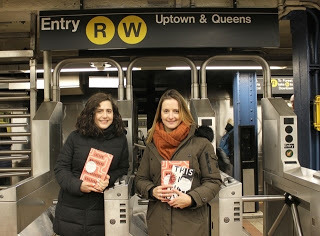
So there you are on the New York City subway, cranky because the E train is late as usual, or because the Number 6 is crowded and two guys are man-spreading, and a woman is eating a slice of pizza right beside you and you are all in white. And then you see it. A book like an invitation. Maybe it's tucked into one of the benches. Maybe it's on a trash can. And you pick it up and read it and then pass it on. That's Books on the Subway, the brain child of Hollie and Rosy. And they are spreading literature all over New York City. I had to interview them. Thank you, thank you Hollie and Rosy!
To learn more about this movement, visit the website Books On The Subway, or connect with Hollie and Rosy on their social sites at Twitter @bookssubway and Insta: @booksonthesubway.
And think about spreading this to YOUR community.
So how did Books on the Subway come about? And how do people know that it is okay to pick up a book and take it?
Hollie Started Books on the Underground back in London in 2012. Rosy saw a tweet from Leo Burnett, London about the project. She reached out to Hollie about the project and asked if she could start it in New York. Books on the Subway has been running in NYC since 2013 and now 4 years later, Hollie moved out to NYC and they run the project together. We leave about 20-100 books per day on the subway. The books have a sticker that say 'Take me, Read me and Return Me', so it's really clear what book finders have to do.
What has the reaction been?
The reaction has been overwhelmingly positive. Everyone is over the moon when they find and book. And these small acts of kindness make people remember why they love living in NYC.
Are there certain kinds of books that do better on the subway than others, and if so why?
Books that tie in to NYC seem to do really well, people just love to feel connected to the city they live in. And some of the romanticized stories of New York city life are fun to read when you're actually living in the city itself. Other titles that tie into a cause or a certain holiday do really well, whether it's a story about MS on MS awareness week or an anti-bullying book that spreads a good message. It's always nice to do a book that has real relevance.
What's been your biggest surprise about this program? And how can people help spread the word, or start a similar thing in their own city? And how do you track how many people have taken a specific book to read?
I think our biggest surprise is how many people want to get involved, and just how many people want to do it in their own city. People can just spread the word by sharing on social and telling their friends. Getting people to actively search for the books on their daily commute is our aim. We don't track the books, it's an organic project. We see people tweeting or instagramming the books they pick up, but that's not a guarantee. But we do know that when we leave a book on a bench it's normally gone within about 2-3 mins after being put down.
What's obsessing you now and why?
We're obviously obsessed with growing and spreading the project, to get books to as many people as possible. Getting more awareness is key, it means that more people are looking out for our books on the subway and getting excited and reading more! But on top of that, we're obsessing over how we can make it more than just 'Books on the Subway', we're trying to figure out what else we want to stand for, and how can we do more for the literary world!
What question didn't I ask that I should have?
Why! Why do we do this? That's what people always ask. And we do it because of 2 things. We both love reading and we both love NYC. And if we can get people to fall back in love with reading and their city, then we'll be happy!
Published on April 19, 2017 11:28
April 14, 2017
A wildly dysfunctional family. Anti-Semitism. Climate change. David Samuel Levinson talks about his wickedly funny new novel that turns a murder mystery on its head, TELL ME HOW THIS ENDS WELL
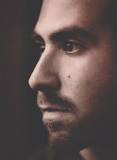
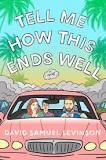
"A wickedly funny, intelligent examination of the dynamics of a uniquely strange family, and David Samuel Levinson guides these characters through a plot that intensifies in such unexpected ways. Against a backdrop that feels both terrifying and yet utterly plausible, Levinson again and again finds ways to make the struggles of this clan explode with a kind of humor that most writers could not dream of pulling off. A daring, memorable novel."KEVIN WILSON, author of The Family Fang
I first met David Samuel Levinson at a book party and we became fast friends. We share a tangled past, a wry sense of humor, and he's just fun to be around. He's also the author of the novel, Antonia Lively Breaks the Silence, and the short story collection, Most of Us Are Here Against Our Will (Great titles, right?) and his spectacular latest, Tell Me How This Ends Well, about a wildly destructive family. He's been nominated for the Pushcart Prize and received fellowships from Yaddo, Ledig House, the Sewanee Writers' Conference and more.
And I'm totally jazzed to host him here. Thanks, thanks, thanks, David.
Whenever critics talk about you, they always use the word ambitious. Is being ambitious in your work something you deliberately do? Are you always challenging yourself, or is it just the nature of the writing beast—that the story you want to write starts presenting this challenge to you?
I’m always striving for originality. Maybe that’s what they mean by ambition? I know, I know. Nothing’s original anymore, but that’s not to say we can’t continue to push the boundaries of what’s been done and make the material fresh(er) for the reader. Tell Me How This Ends Well takes a murder plot and turns it on its head in a humorous and disastrous way. I wanted to write a funny book about an unfunny subject: that was the gauntlet I threw down for myself. I’m kind of obsessed with criminality and what might force someone to take another human life. In this case, the three Jacobson siblings, each of whom has his or her own reason for wanting to do away with their father, though in the end they band together out of love for their dying mother—their father, it seems, is hastening her death. The book presented a number of challenges right off the bat, specifically when and where to set it. But once I determined those, it kind of wrote itself. Even before I sat down to write it, there were themes already at play, themes I’d been thinking about for years—the theme of anti-Semitism, of drought, of emotional terror, and political terrorism. I had to braid these disparate strands carefully into a narrative and that narrative eventually became Tell Me How This Ends Well.
What was haunting you that made you need—as well as want—to write this novel? And why did you decide to set it in the near future.
I was obsessed with two things at the time—the rise of anti-Semitism in Europe and at home and the drought in California, Texas, and elsewhere. Hatred and climate change, if you will. The novel doesn’t answer where the world’s oldest hatred comes from because that’s a fool’s errand and it certainly doesn’t tackle the issue of climate change, but what it does do—I hope, at least—is show the relationship between the two. What I mean is, I wanted to write a book in which two of the most important and necessary natural resources in the world were threatened with extinction: in this case, the Jewish people on the one hand and water on the other. I set the novel in the near future, in 2022, because it just seemed more apt than to set it in the here and now, although it’s eerie to see certain events in the novel play themselves out in real time.
As someone who never can title a novel decently, I deeply admired your title. How’d you decide on it? And were there other titles?
Thanks! Titles are everything! During my first conversation with my editor, which ran about an hour, she did most of the talking, praising the novel for this and that. Then in the last five minutes she brought up the title, which at the time was Everything Not Saved Will Be Lost. In case you don’t know, ENSWBL is the message that pops up when Wii crashes. I loved the title. It fit the book perfectly. But she didn’t like it and thought it was too hard for a reader to remember. She suggested we call the book Tell Me How This Ends Well, which happens to be the title of a play within the novel itself. I said sure. And thus Tell Me How This Ends was born.
Can you talk about the significance of setting the novel during Passover?
Passover is one of the more significant and festive of the Jewish holidays. It marks the Israelites emancipation from slavery in Egypt. I set the novel during Passover because I liked the parallels between the modern and the ancient—the Jacobson siblings’ desire to be free of their horrible father just as the Israelites’ wanted to be free of pharaoh. The Passover story is also a dark one, full of plagues and sacrifices and the Angel of Death. I liked how that story runs in the background, a current that carries the entire narrative to its only logical end.
I have to admit I loved the black comedy of the novel. It’s dark and yet ferociously funny. How difficult was it to manage this balancing act?
Honestly, it was pretty easy. Again, I wanted to make the reader laugh in the face of horror. It’s not an easy book. I get that. I’m not sure you’d take it to the beach with you. But I am pretty sure it speaks to any and every reader out there who’s ever been bullied and terrorized by a family member. Emotional abuse is rarely talked about within the family structure—most of the time, it’s an open secret about which everyone makes an uneasy peace. But what if your family member really is a psychopath or a malignant narcissist? What if you’ve suffered untold humiliation and psychological torture at his or her hands? The Jacobson children, it must be stated, are not acting out of greed or selfishness. They’re acting out of desperation and selflessness and revenge. They’re not like the Menendez brothers in that they don’t plot to kill their father for the inheritance. It’s for something far greater and turns each into someone else by the end of the book. That’s the power of humor—to transform a terrifically unpleasant situation into something manageable. Jewish people have a specific way of dealing with tragedy, which comes out in our humor. I couldn’t see writing Tell Me How This Ends Well without showcasing my own comedic nature. I love to be funny. I love to make people laugh. I also love to call attention to the hardships that life presents us with at times, like the impending death of a beloved mother. Levity is an antidote against the terrors of the world. And in the world of the Jacobson family terror abounds.
What’s obsessing you now and why?
I dare say it but I’m obsessed with my next book! It’s an insane story about writers and Nazis and Staten Island and Jews and a missing Van Gogh. It takes place in New York City in 2005. The main character, Julius Ullman Spitsberg is a waiter at a popular Vietnamese restaurant in the East Village called Pho Kim Long. When his ex-wife goes missing, he goes to look for her at the home of a famous and reclusive writer who lives on Staten Island. Mayhem and murder ensue! It’s called I Am Gone Forever…
Published on April 14, 2017 11:14



